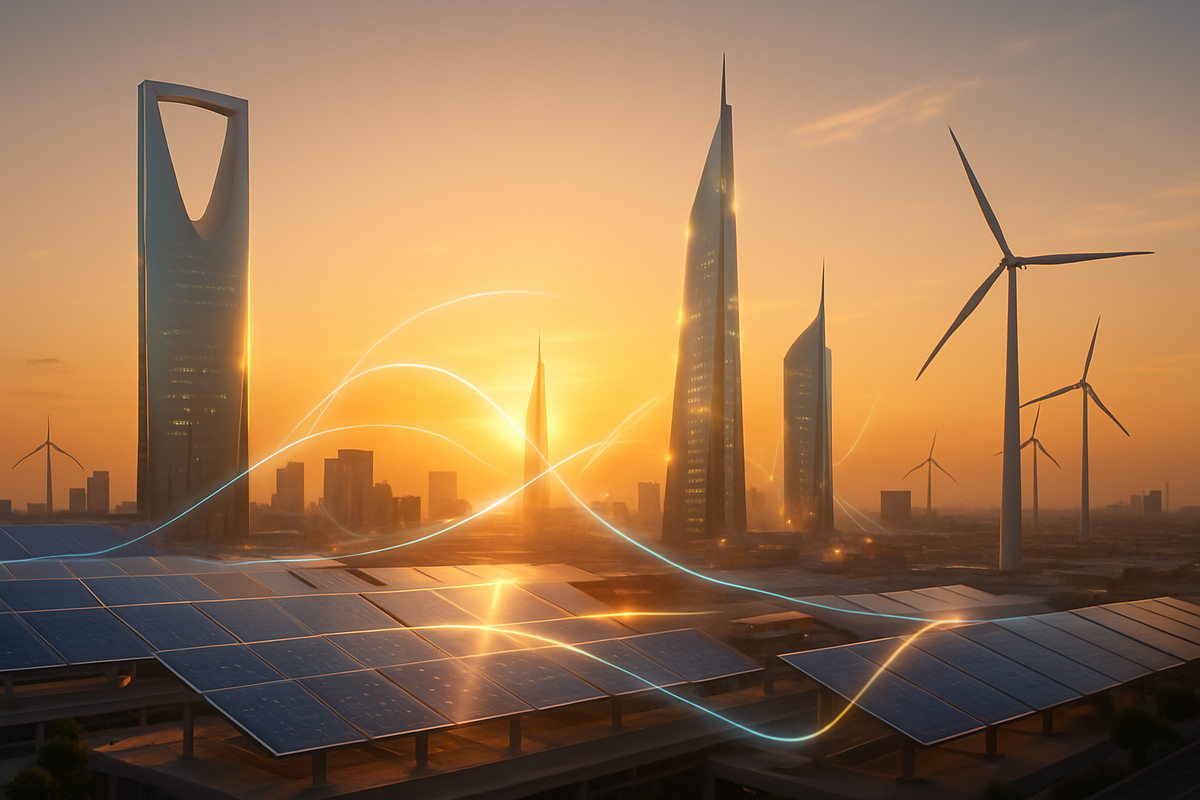
The eagerly anticipated Innovation Zero MENA Congress, a cornerstone event for the Middle East and North Africa's (MENA) net-zero ambitions, has been strategically rescheduled to October 2026 in Riyadh, Saudi Arabia. This significant adjustment, announced against the backdrop of an accelerating global energy transition, positions the congress as a crucial platform for fostering climate innovation, attracting investment, and shaping policy across the region. While the delay might seem considerable, it is a calculated move designed to enhance program development, ensure deeper strategic alignment with regional initiatives like Saudi Arabia's Vision 2030, and ultimately amplify the event's impact on expediting the MENA region's shift towards a low-emission economy. The extra lead time will allow for a more robust and comprehensive dialogue, ensuring that when the congress convenes, it will serve as an even more powerful catalyst for sustainable development.
This rescheduling, which pushes the main event beyond the current date of October 10, 2025, underscores a commitment to maximizing the congress's effectiveness. It provides an extended window for meticulous planning, allowing stakeholders to develop a rich tapestry of digital and in-person content that will maintain engagement and connectivity in the run-up to 2026. This prolonged preparation period is not merely about logistics; it's about embedding the congress within the broader narrative of regional economic transformation and sustainability leadership, setting the stage for a truly pivotal moment in the MENA's journey towards a net-zero future.
A Grand Vision for a Sustainable MENA: Objectives and Strategic Timelines
The Innovation Zero MENA Congress, building upon the success of its London counterpart, is a collaborative endeavor with Saudi Arabia's Research, Development and Innovation Authority (RDIA). Its core mission is multifaceted: to accelerate the MENA region's transition to a low-emission economy, foster unparalleled public-private sector collaboration, and drive tangible impact by scaling net-zero solutions. The congress aims to attract significant investment, forge strategic partnerships, and accelerate market entry for groundbreaking innovations, thereby generating measurable impact both regionally and globally.
The event is designed to dismantle traditional industry silos, facilitating critical connections across diverse sectors including energy, urban development, infrastructure, environmental protection, finance, and advanced technology. Key areas of focus include the deployment of renewable energy, modernization of electrical grids, advancements in hydrogen technologies, Carbon Capture, Utilization, and Storage (CCUS), the circular economy, AI-enabled efficiency, and sustainable urban development. These themes are not merely theoretical; they are integral components of ambitious national frameworks such as Saudi Arabia's Vision 2030 and the UAE's Net Zero 2050 initiatives, which seek to position the region as a global leader in clean energy and sustainable industries.
The timeline leading up to the October 2026 congress in Riyadh is structured to maintain continuous engagement. A dedicated MENA program will be featured at the Innovation Zero World Congress in London in April 2026, serving as a significant precursor. This will be complemented by a series of high-level roundtables and online events scheduled throughout 2025 and 2026. These pre-congress initiatives are crucial for keeping the community informed, fostering early collaborations, and building momentum. The decision to host the main event in Riyadh is particularly strategic, aligning with the Kingdom's extensive economic transformation efforts and its commitment to becoming a sustainable, diversified, and innovation-driven economy. This extended preparation allows the congress to prominently showcase the region's advancements in clean energy solutions and sustainable infrastructure, positioning the 2026 gathering as a powerful catalyst for sustainable development.
Market Movers: Companies Poised to Gain or Face Challenges
The Innovation Zero MENA Congress, even in its rescheduled future state, casts a long shadow over the financial markets, particularly for companies operating within or looking to enter the MENA region's burgeoning clean energy sector. The event's focus on net-zero solutions and energy transition presents significant opportunities for innovators, investors, and solution providers, while also posing strategic challenges for those heavily invested in traditional fossil fuel economies.
Companies specializing in renewable energy technologies are set to be major beneficiaries. ACWA Power (TADAWUL: 2082), a Saudi Arabian developer, investor, and operator of power generation, desalinated water, and green hydrogen plants, stands to gain immensely. Their extensive portfolio of solar, wind, and green hydrogen projects across the MENA region directly aligns with the congress's objectives. Similarly, international players like Masdar (private), Abu Dhabi's flagship renewable energy company, will find the congress a crucial platform for showcasing their projects and forging new partnerships. These companies are at the forefront of deploying large-scale renewable energy infrastructure, which is central to the region's net-zero aspirations.
The emphasis on hydrogen technologies and Carbon Capture, Utilization, and Storage (CCUS) also highlights potential winners. Companies like Saudi Aramco (TADAWUL: 2222), despite its oil and gas origins, is making significant investments in CCUS and blue hydrogen projects, aiming to decarbonize its operations and offer lower-carbon energy solutions. The congress provides a vital forum for such energy giants to demonstrate their transition strategies and attract further investment in these nascent, yet critical, technologies. Furthermore, technology providers in areas like smart grid solutions, energy storage, and AI-enabled efficiency – many of which are global tech firms – will find a receptive market and potential partners at the congress.
Conversely, companies that are slow to adapt or heavily reliant on traditional, carbon-intensive industries without a clear transition strategy may face increasing pressure. While the MENA region remains a significant producer of fossil fuels, the clear policy direction towards net-zero, reinforced by events like this congress, signals a gradual but inevitable shift in investment priorities. These companies will need to accelerate their decarbonization efforts, diversify their energy portfolios, and embrace new technologies to remain competitive and attractive to investors in a rapidly evolving market. The congress will serve as a bellwether for the pace and direction of this transition, influencing investment flows and strategic decisions across the energy landscape.
Broader Implications: Reshaping Regional Economies and Global Partnerships
The Innovation Zero MENA Congress's strategic rescheduling and comprehensive agenda underscore a wider significance that extends far beyond a single event. It reflects the MENA region's resolute commitment to spearheading its own energy transition and establishing itself as a global leader in sustainable development. This initiative fits seamlessly into broader industry trends emphasizing decarbonization, circular economy principles, and technological innovation as critical drivers of economic growth. The region, traditionally known for its hydrocarbon wealth, is now actively diversifying its economies, with clean energy and green technologies at the forefront of this transformation.
The potential ripple effects on competitors and partners are substantial. Regionally, the congress is expected to catalyze increased competition among local and international companies vying for contracts in renewable energy, hydrogen, CCUS, and sustainable infrastructure projects. It will also foster new partnerships, bringing together global technology providers with local developers and investors to accelerate project execution. Internationally, the event will likely solidify the MENA region's position as an attractive destination for green investments, potentially drawing capital from global funds and development banks eager to support climate-aligned initiatives. This could lead to a re-evaluation of investment strategies by major international energy companies, compelling them to increase their focus on sustainable ventures within the MENA market.
From a regulatory and policy perspective, the congress will serve as a critical forum for discussing and potentially influencing regional climate policies. The alignment with Saudi Arabia's Vision 2030 and the UAE's Net Zero 2050 initiatives suggests that the discussions and outcomes of the congress will directly inform and reinforce regulatory frameworks aimed at achieving net-zero targets. This could include policies supporting carbon pricing, renewable energy mandates, green hydrogen production incentives, and sustainable urban planning. Historically, similar large-scale convenings, such as COP summits, have played pivotal roles in shaping global climate agendas and catalyzing national policy shifts. While the Innovation Zero MENA Congress is regional in scope, its focus on actionable solutions and investment makes it a potent force for tangible policy evolution. The extended preparation time also allows for greater policy alignment and stakeholder engagement, ensuring that the congress's recommendations are well-vetted and actionable.
The Path Forward: Strategic Pivots and Emerging Opportunities
Looking ahead, the rescheduling of the Innovation Zero MENA Congress to October 2026 provides both short-term and long-term possibilities for the region's energy transition. In the short term, the pre-congress engagement activities, including the dedicated MENA program at the Innovation Zero World Congress in London in April 2026 and the series of roundtables throughout 2025-2026, will be crucial. These events offer immediate platforms for dialogue, preliminary deal-making, and the showcasing of early-stage innovations, building a steady momentum towards the main event. Companies and governments will use this period to refine their net-zero strategies, identify potential partners, and prepare concrete proposals for presentation in Riyadh.
In the long term, the congress is expected to serve as a significant launchpad for sustained investment and infrastructure development across the MENA region. It will likely accelerate the adoption of advanced clean energy technologies, from utility-scale solar and wind farms to cutting-edge hydrogen production facilities and sophisticated carbon capture solutions. This will necessitate strategic pivots for many public and private entities. Traditional energy companies will need to continue their diversification efforts, investing heavily in low-carbon alternatives, while technology firms will find an expanding market for their innovative solutions. Governments will be tasked with creating stable and attractive regulatory environments to facilitate these investments and foster a thriving green economy.
Emerging market opportunities are vast, encompassing not only direct energy solutions but also supporting industries such as green finance, sustainable logistics, environmental consulting, and specialized training programs for the new energy workforce. The congress will highlight these opportunities, encouraging both local entrepreneurship and international collaboration. Potential scenarios and outcomes range from a rapid acceleration of the MENA region's energy transition, leading to significant economic diversification and job creation, to a more gradual shift if investment or policy implementation faces unforeseen hurdles. However, the strong governmental backing and the region's abundant renewable energy resources suggest a high probability of successful outcomes, positioning the MENA region as a global benchmark for sustainable development in the coming decades.
A New Era for MENA: Assessing the Market and Investor Outlook
The Innovation Zero MENA Congress, even with its future date in October 2026, stands as a critical marker in the MENA region's journey towards a net-zero future. The rescheduling, rather than delaying progress, signifies a strategic commitment to a more impactful and comprehensive event, deeply integrated with the region's long-term economic and environmental ambitions. The key takeaway from this development is the unwavering dedication of MENA nations, particularly Saudi Arabia, to pivot towards sustainable economies powered by clean energy and innovative technologies. This commitment is not merely aspirational; it is being backed by significant investment, policy reforms, and a concerted effort to foster collaboration among global and regional stakeholders.
Moving forward, the market can expect an intensified focus on green investments within the MENA region. This will translate into increased capital flows into renewable energy projects, hydrogen production facilities, carbon capture technologies, and sustainable urban development initiatives. The congress will serve as a crucial barometer for the pace and direction of these investments, offering insights into emerging technologies and partnership opportunities. Public companies already engaged in these sectors, such as ACWA Power (TADAWUL: 2082) and Saudi Aramco (TADAWUL: 2222) (through its decarbonization efforts), are well-positioned to capitalize on this trend, while new entrants and technology providers will find fertile ground for growth.
For investors, the coming months leading up to the 2026 congress will be a period to closely monitor policy developments, project announcements, and strategic partnerships emerging from the MENA region. Watch for further details on the pre-congress engagement activities, as these will provide early indicators of key themes and potential beneficiaries. The congress represents a clear signal of the region's long-term vision, and investors who align their portfolios with the principles of net-zero and sustainable innovation are likely to reap significant rewards as the MENA region solidifies its role as a global leader in the new energy landscape. The strategic delay is not a pause, but a deliberate acceleration towards a more robust and impactful energy transition.
This content is intended for informational purposes only and is not financial advice







